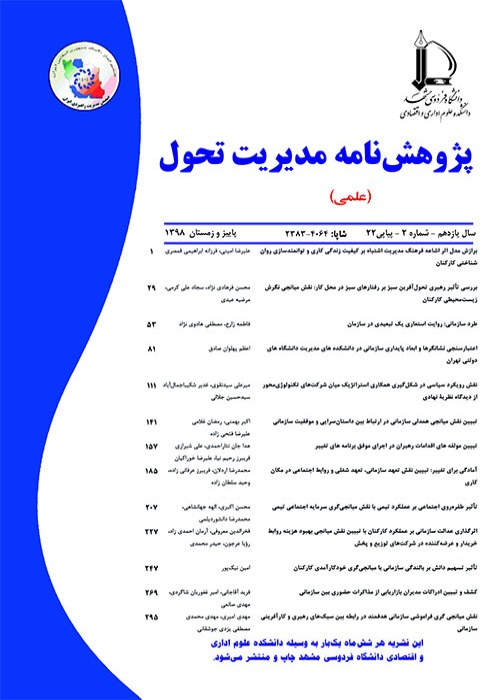An investigation of the behavioral consequences of spirituality in the workplace
Todays, employees spend more of their time in the workplace and with their colleagues. They tend to seek meaning, purpose, and sublimity in their work from which they somehow extract their social identity. Spirituality in the workplace refers to the employee' efforts in seeking meaning and purpose in their work. Indeed, employees tend to devote all three dimensions of their existence, i.e. physical, mental and spiritual, to the work, hence it may seem impossible to separate the work life from the spiritual one, for it may even reduce their morale as well. On the other, the workplace condition has changed, thus presenting meaningful work is considered to be a crucial element to attract and retain the new millennium generation. literature review reveals that the concept of 'spirituality in the workplace' is an emerging concept aiming to create a sort of integration between the external and internal life, especially in the business environment of organizations. Furthermore, it could create a trustful atmosphere among employees, provide organizational happiness, and reduce destructive behaviors. Accordingly, the present study aimed at investigating the impact of spirituality in the workplace on some of organizational behavior variables in an attempt to discover the effectiveness of spirituality in the workplace on both negative and positive variables that less studied in the previous research. These variables include: honesty and trust, organizational happiness, and anti-citizenship behavior. Thus, this study may address the question 'whether spirituality in the workplace affects the positive variables (honesty and trust, organizational happiness) and negative variables (anti-citizenship behavior) of the organizational behavior?
THEORETICAL FRAMEWORK
Spirituality in the workplace can be considered as the employees' experience of meaning in the workplace. One of the important achievements of spirituality in the workplace involves this recognition that employees have an internal life feeding and fed by the meaningful work taken place in the social context. reviewing the literature reveals that spirituality in the workplace given its impact on the various organizational variables including job satisfaction, employee motivation, professional conscience, honesty, trust, organizational commitment, turnover rate, job performance, organizational citizenship behavior and even employees' knowledge sharing, may lead to significant consequences towards increasing productivity of the organization. Accordingly, in the present study, the impact of spirituality in the workplace on some of important organizational variables was investigated in the form of the following hypotheses:
H1: Spirituality in the workplace significantly affects the honesty and trust of employees.
H2: Spirituality in the workplace significantly affects the organizational anti-citizenship behavior.
H3: Spirituality in the workplace affects the organizational happiness.
H4: Spirituality in the workplace affects the organizational anti-citizenship behavior through job satisfaction.
The present study is considered as applied, from the perspective of purpose, and descriptive-survey, from that of research method. considering the size of the population, 195 employees were finally selected as the sample by stratified sampling method. Data was collected through a questionnaire. Data analysis was conducted using structural equations. The questionnaire validity was confirmed through content and construct validity. Finally, the hypotheses were tested by structural equation modeling and AMOS 22 software.
The results obtained from the hypothesis testing revealed that spirituality in the workplace has a significant impact on honesty and trust. Accordingly, it can be suggested that the more spirituality in the workplace, the higher the honesty and trust among employees, enabling organization to take advantage of such honesty and trust to establish effective and useful communication, perform tasks as teamwork, and create a friendly and transparent atmosphere in the organization. The results obtained from the second hypothesis testing indicated that spirituality in the workplace has a significant and negative impact on the employees' anti-citizenship behavior. Put it another way, establishing a workplace based on the spiritual values may reduce the occurrence of immoral and anti-citizenship behaviors in the workplace and decrease the latter on behalf of the employees. The third hypothesis testing indicated that spirituality in the workplace has a significantly positive effect on organizational happiness. And ultimately, the fourth hypothesis testing revealed that spirituality in the workplace may influence the anti-citizenship behavior through job satisfaction. Therefore, it can be concluded that spirituality in the workplace may indirectly affect the organizational anti-citizenship behavior through the employees' attitudes.
CONCLUSIONS & SUGGESTIONS
Organization managers are recommended to strengthen the spirituality indicators to not only benefit from its further advantages but also to increase the level of trust and honesty among employees and subsequently create an atmosphere where employees can form their interaction with others in a trustful way, leading the feeling of worthiness and meaningfulness among employees. Furthermore, to ensure the occurrence of organizational citizenship behaviors and reduce anti-citizenship behaviors, managers are recommended to create a kind of intimacy, integrity and friendship between managers and employees and increase the variables of spirituality in the workplace by developing teamwork, creating mutual trust among members, creating common goals and values, realizing organizational justice as well as the primacy of public interest over personal ones. Additionally, managers are recommended to providing the condition for employees to feel being relaxed, pleasure, and happy during their working hours and feel satisfy with the condition in which they work and consequently pave the way for creativity, innovation and the emergence of latent talents by applying measures to increase the meaning and spirituality in the workplace.
- حق عضویت دریافتی صرف حمایت از نشریات عضو و نگهداری، تکمیل و توسعه مگیران میشود.
- پرداخت حق اشتراک و دانلود مقالات اجازه بازنشر آن در سایر رسانههای چاپی و دیجیتال را به کاربر نمیدهد.




